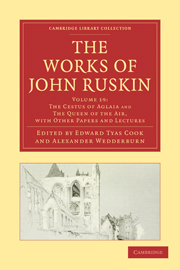Book contents
- Frontmatter
- Contents
- LIST OF ILLUSTRATIONS
- INTRODUCTION TO THIS VOLUME
- PART I “SIR JOSHUA AND HOLBEIN” (1860)
- PART II “THE STUDY OF ARCHITECTURE IN SCHOOLS” (1865)
- PART III “THE CESTUS OF AGLAIA” (1865, 1866)
- PART IV “THE RELATION OF NATIONAL ETHICS TO NATIONAL ARTS,” BEING THE REDE LECTURE FOR 1867
- PART V “ON THE PRESENT STATE OF MODERN ART, WITH REFERENCE TO THE ADVISABLE ARRANGEMENT OF A NATIONAL GALLERY” (1867)
- PART VI “FAIRY STORIES”: A PREFACE TO “GERMAN POPULAR STORIES” (1868)
- PART VII “THE FLAMBOYANT ARCHITECTURE OF THE VALLEY OF THE SOMME” (1869)
- PART VIII “THE QUEEN OF THE AIR” (1869)
- PART IX “VERONA, AND ITS RIVERS” (1870)
- APPENDIX: REPORTS OF ADDRESSES ON ART
- Plate section
PART IV - “THE RELATION OF NATIONAL ETHICS TO NATIONAL ARTS,” BEING THE REDE LECTURE FOR 1867
Published online by Cambridge University Press: 05 November 2011
- Frontmatter
- Contents
- LIST OF ILLUSTRATIONS
- INTRODUCTION TO THIS VOLUME
- PART I “SIR JOSHUA AND HOLBEIN” (1860)
- PART II “THE STUDY OF ARCHITECTURE IN SCHOOLS” (1865)
- PART III “THE CESTUS OF AGLAIA” (1865, 1866)
- PART IV “THE RELATION OF NATIONAL ETHICS TO NATIONAL ARTS,” BEING THE REDE LECTURE FOR 1867
- PART V “ON THE PRESENT STATE OF MODERN ART, WITH REFERENCE TO THE ADVISABLE ARRANGEMENT OF A NATIONAL GALLERY” (1867)
- PART VI “FAIRY STORIES”: A PREFACE TO “GERMAN POPULAR STORIES” (1868)
- PART VII “THE FLAMBOYANT ARCHITECTURE OF THE VALLEY OF THE SOMME” (1869)
- PART VIII “THE QUEEN OF THE AIR” (1869)
- PART IX “VERONA, AND ITS RIVERS” (1870)
- APPENDIX: REPORTS OF ADDRESSES ON ART
- Plate section
Summary
1. On entering on the duty to-day entrusted to me, I should hold it little respectful to my audience if I disturbed them by expressions of the diffidence which they know that I must feel in first speaking in this Senate House—diffidence which might well have prevented me from accepting such duty, but ought not to interfere with my endeavour simply to fulfil it. Nevertheless, lest the direction which I have been led to give to my discourse, and the narrow limits within which I am compelled to confine the treatment of its subject may seem in any wise inconsistent with the purpose of the Founder of this Lecture—or with the expectations of those by whose authority I am appointed to deliver it—let me at once say that I obeyed their command, not thinking myself able to teach any dogma in the philosophy of the arts which could be of new interest to the members of this University, but only that I might obtain the sanction of their audience for the enforcement upon other minds of the truth which, after thirty years spent in the study of art—not dishonestly, however feebly—is manifest to me as the clearest of all that I have learned, and urged upon me as the most vital of all I have to declare—namely, that the faculty for art is not one which we can separately cultivate, still less, in the exercise of it, a gift which can be learned by imitation or direction, but that in this faculty we are to hail a visible sign of national virtue; it springs from such virtue without fail or stint, and no artificial stimulus can produce anything but a semblance and mockery.
- Type
- Chapter
- Information
- The Works of John Ruskin , pp. 161 - 194Publisher: Cambridge University PressPrint publication year: 2010First published in: 1905



